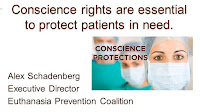The speech by Kelly Block MP from March 28 supporting Bill C-230 - The Protection of Freedom of Conscience Act.
Link to the video of Kelly Block's speech in parliament.
Sign the online Petition in support of Bill C-230 (Link)Order MP postcards (at no cost) supporting Bill C-230 to send to your Member of Parliament by contacting EPC at: 1-877-439-3348 or office@epcc.ca
------------
Mr. Speaker, it is a privilege to rise today to begin the debate on my private member's bill, Bill C-230,
the protection of freedom of conscience act. This bill revives my
private member's bill, which died on the Order Paper, from the last
Parliament, with some slight modifications.
 I would be remiss if I did not once again acknowledge that this bill is built on the hard work and determination of former members of Parliament. The first bill proposed to address this issue was introduced by the late Mark Warawa in 2016. His bill did not proceed because of the government's introduction of Bill C-14. After Bill C-14 was passed into law, my former colleague David Anderson introduced his private member's bill, Bill C-418, during the 42nd Parliament. However, that bill also died on the Order Paper when the general election was called in 2019.
I would be remiss if I did not once again acknowledge that this bill is built on the hard work and determination of former members of Parliament. The first bill proposed to address this issue was introduced by the late Mark Warawa in 2016. His bill did not proceed because of the government's introduction of Bill C-14. After Bill C-14 was passed into law, my former colleague David Anderson introduced his private member's bill, Bill C-418, during the 42nd Parliament. However, that bill also died on the Order Paper when the general election was called in 2019.
I would like to thank all those who have been championing this issue for many years and their willingness to work with me. Experts throughout Canada have provided information and advice, while thousands of grassroots Canadians voiced their support for protecting our fundamental freedoms. I would also like to thank the Library of Parliament for its timely, diligent and expert research, which helped inform this proposed legislation.
For the purposes of this debate, I think it is important to understand conscience. There are numerous definitions of conscience, but they are consistent in defining it as an individual’s inner sense of knowing the difference between what is right and wrong and allowing that knowledge to guide their behaviour. The Canadian Charter of Rights and Freedoms, under the heading of “Fundamental Freedoms”, in subsection 2(a) states that everyone has the fundamental freedom of conscience. In this way, Bill C-230 is straightforward. It seeks to add two new offences to the Criminal Code of Canada. I will read the summary so members will know what they are:
This enactment amends the Criminal Code to make it an offence to intimidate a medical practitioner, nurse practitioner, pharmacist or other health care professional for the purpose of compelling them to take part, directly or indirectly, in the provision of medical assistance in dying.
It also makes it an offence to dismiss from employment or to refuse to employ a medical practitioner, nurse practitioner, pharmacist or other health care professional for the reason only that they refuse to take part, directly or indirectly, in the provision of medical assistance in dying.
This bill is a response to calls from disability rights groups, first nations, the Ontario Medical Association, legal experts and many medical and mental health professionals to protect conscience rights. It ensures that medical professionals who choose not to take part in or refer a patient for assisted suicide or medical assistance in dying will never be forced or coerced to violate their freedoms as stated in the charter.Previous Parliaments have passed laws that created the unintended consequence of doctors and medical professionals being forced to participate in providing a patient's death, regardless of whether they believe it is in their best interest. Bill C-14 and Bill C-7 created a federal standard for medical assistance in dying and assisted suicide but not for conscience protections.
By way of background, sections 241.1 to 241.4 of the Criminal Code of Canada deal with the provision of medical assistance in dying. These sections are in part VIII of the code. It deals with offences against the person and reputation, which include offences such as homicide, kidnapping, assault and many more. Subsection 241(1) of the Criminal Code still makes it a criminal offence to counsel or aid in a suicide. It reads:
Everyone is guilty of an indictable offence and liable to imprisonment for a term of not more than 14 years who, whether suicide ensues or not,
(a) counsels a person to die by suicide or abets a person in dying by suicide; or
(b) aids a person to die by suicide.
When creating the exemption allowing for MAID, the government had to create an exemption to this prohibition on counselling or aiding in suicide. This then leads to the untenable claim that the Criminal Code already protects the conscience rights of medical professionals.
Some claim that the clarification clause, section 241.2 (9) of the Criminal Code, somehow protects conscience rights. It states:
For greater certainty, nothing in this section compels an individual to provide or assist in providing medical assistance in dying.
While I understand why some would want to think it protects conscience rights, I believe they are sadly mistaken. While I appreciate and support this inclusion in the Criminal Code, it only addresses one side of the coin. This clause only confirms that the Criminal Code is not the source of compulsion to participate in medical assistance in dying.
For the Criminal Code to have any teeth on this issue, it should articulate that it is an offence to compel someone to provide, or assist in providing, medical assistance in dying against their will. Compelling someone to participate in MAID can and does happen, which is why I have brought forward this legislation and why it needs to pass.
Regarding jurisdictional questions about this bill, as I mentioned earlier, this bill proposes that two new offences be added to the Criminal Code of Canada to address intimidation, dismissal from employment or refusal to employ a medical professional. This is similar to section 425 of the Criminal Code, which addresses the same actions taken by an employer to compel employees with respect to belonging to or organizing a union. I would suggest that if it is appropriate to have section 425 in the Criminal Code, it is reasonable to include the amendments I am proposing.
I would also submit that it is inaccurate to argue that conscience rights legislation somehow interferes with the role of the provinces while, at the same time, believing that the legalization of medical assistance in dying does not. Ensuring that conscience rights are protected is the responsibility of Parliament and of the Government of Canada, which is why I introduced this bill and why it should be passed.
Additionally, provinces can introduce their own conscience rights legislation for medical professionals. For example, Manitoba has passed simple and clear legislation in this regard, and I would encourage all provincial legislatures and parliaments to follow Manitoba’s example.
While the text of this bill focuses on the conscience rights of medical professionals, this legislation also serves to protect the right of patients to receive a second opinion. What do I mean by this? If all doctors are forced to propose MAID as a treatment option to their patients, this one-size-fits-all approach would give Canadian patients less choice, not more.
Additionally, individuals who object to MAID would be deterred from entering the medical profession altogether. Patients would no longer be able to seek a second opinion for their end-of-life care. In this way, conscience rights for medical professionals not only protect medical professionals and their patients, but they also protect our health care system.
Without conscience rights, doctors are constrained to provide, or refer their patients to receive, medical assistance in dying, regardless of whether it is their professional opinion that it is in the best interest of the patient. This concern for the patient’s best interest does not mean that a medical professional objects to medical assistance in dying in all cases, just that in his or her opinion it is not an option that should have to be offered in every case. This became especially pertinent to the medical community with the passage of Bill C-7.
To highlight the impact of the removal of the safeguard that death be reasonably foreseeable, I would like to quote from a recent column published online in Policy Options magazine which states the following:
Many injuries and physical illnesses are indeed accompanied by temporary depression and suicidal thinking. For example, research demonstrates increased risk of suicide for two years after a spinal cord injury. This suicidality overwhelmingly ends with adaptation and recovery support. Offering death to anyone during a period of transient increased suicidality is, in our view, unethical and violates the standard of medical care by which physicians must abide.
The fact that the newly expanded law may facilitate death in those circumstances of increased suicidal thinking is, in and of itself, problematic.
Some have tried to frame conscience rights as the rights of the patient versus the rights of the doctor. Nothing could be further from the truth.Health care is fundamentally about the doctor-patient relationship. For example, take the psychiatrist who supports MAID in certain circumstances, but in a certain case has spent 15 years counselling a patient who suffers from bouts of depression and suicidality. For 15 years, they have built understanding and trust. What would happen if that patient, suffering from a bout of suicidality, should demand assisted suicide? Under current law, that psychiatrist would be forced to refer that patient to someone else so he or she could die. They must do this, despite knowing that the suicidal thoughts are temporary and that otherwise the patient is joyful and loves his or her life. Ending that patient's life would be wrong, but the psychiatrist’s hands are tied. This should not be what passes for medical care in Canada.
Some might claim that there are safeguards in place to prevent such tragedies, but I would ask them if they are absolutely sure. With the passage of Bill C-7, many safeguards for medical professionals were removed. We are talking about ending a human life. There is no room for uncertainty when a life hangs in the balance.
Additionally, should the first line of safeguards not be the expertise of the medical professionals who know their patients best? If those medical professionals do not believe death is the answer, should we not at least consider if they are right? However, this then leads to the concern some raise that protecting the conscience rights of medical professionals will block access to those who truly want it. I would suggest this is both misleading and nothing but baseless fearmongering. Medical assistance in dying and assisted suicide are readily available throughout all of Canada. There are information phone lines, hospitals staffed with willing medical professionals, even email addresses to help set up appointments. In a word, MAID has become the status quo. It is available.
The Canadian Medical Association also stated clearly that conscience protections would not affect access because there were more than enough physicians willing to offer MAID. Therefore, common sense should tell us that the charter rights of medical professionals are breached when they are forced to either offer or refer assisted suicide or medical assistance in dying. Surely, we have the capacity to both ensure access to MAID while still protecting the fundamental charter right to freedom of conscience.
Finally, some have suggested that medical professionals should leave their morality at the door. I do not believe we want this to happen. For example, we would all want and expect doctors to be bound by their morals if they were offered a bribe to move someone up on a waiting list. If we hold our medical professionals to a higher standard, we cannot then tell them to ignore their personal moral standards. Further, while discussing the issue of conscience rights with a doctor, she told me that, in the absence of conscience protection, the group with the most to lose are the patients, and they are the ones we are trying to help. This bill protects the doctor-patient relationship by ensuring that doctors and other medical professionals are always able to recommend and provide the care they believe is best for their patients. Patients need this bill to pass. Canada’s medical professionals need this bill to pass.
Over the past two years, we have seen just how important our health care system is and how critical the medical professionals who work in that system are to Canadians and our way of life. We need to create a work environment for medical professionals that protects them, supports them, and encourages them to continue in the critical work they do.
In closing, I encourage all members to support passage of the protection of freedom of conscience act.





.jpg)
.jpg)









